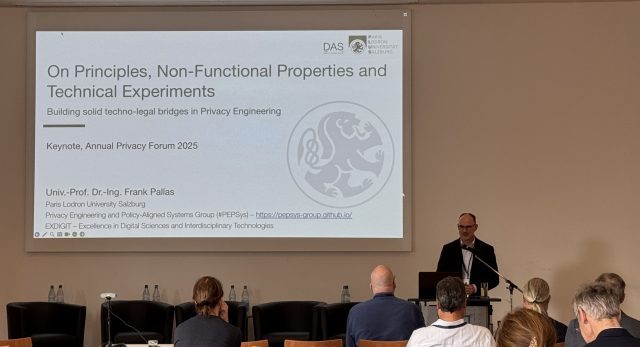Exdigit Research
In 2022, the University of Salzburg founded the new Faculty of Digital and Analytical Sciences (DAS) and has combined its competencies in the digital field such as computer science, data science, human-computer interaction and geoinformatics at the Itzling site and strengthened them with a materials science component.
The EXDIGIT project is intended to give the University of Salzburg and its youngest faculty an even stronger presence in European and national excellence programs or other high-level research initiatives. The special feature here is the close inter-institutional cooperation with Salzburg Research and other partners, such as the Salzburg University of Applied Sciences or the PMU, which is anchored in the project.
Project
EXDIGIT
Funding
Duration
January 1st, 2021 to August 31st, 2027
Budget
12.719.832 Euro
Project partner
Project goals
- Creation and establishment of a research and development platform with international visibility for future-oriented interdisciplinary digital topics.
- Building bridges between the interdisciplinary interfaces of the University of Salzburg with partners within the Salzburg research landscape.
- Creation of three bridge professorships
- Targeted and efficient closing of gaps in knowledge and research chains at the location.
- Positioning the University of Salzburg and the DAS faculty as a leading institution for digital sciences
- Increasing the attractiveness in the international competition for researchers and students as well as for specialists and corporate partners in digital fields
Interactive Intelligent Systems and Recommender Systems
Main focus
Interactive intelligent systems are computational systems designed to dynamically interact with humans, and vice versa. Often, such systems are powered by artificial intelligence and other advanced technologies to respond to user inputs, learn from interactions, and improve their performance over time.
In our research group, we integrate research on intelligent technologies, the interaction of humans with intelligent systems, and their interplay. In this field, our key expertise lies in recommender systems and human-AI interaction in its broader sense.
In our research group, we investigate the full spectrum of recommender systems and human-AI interaction: from (i) investigating humans’ needs of how such systems function to (ii) measuring the implications of these systems. This also includes (iii) evaluating their algorithmic performance, analyzing biases, or studying trust issues, and (iv) improving algorithmic approaches to better align with those needs.
Space & Place LAB
Main focus
Places are among the units we use to structure our lives. We use them to create narratives, and they are considered central to geographical explanation. They are represented in the various media, such as in texts, photographies, paintings, and flim; and we share them socially in may cases. Yet, relatively little is known about what makes information about places and how to handle such type of information.
The Space & Place LAB at the University of Salzburg, Austria, focusses on questions related to a conceptual understanding of place and corresponding information. Our interdisciplinary approach targets an understandings that does justice to the complexity inherent to places.
More about us: Space and Place LAB
Projects
Putting cultural knowledge into context – a pilot project for the semantic linking of information at the Salzburg Open-Air Museum (KuWi)
Like many other open-air museums, the Salzburg Open-Air Museum collects places. Not only buildings from the surrounding countryside have been moved to the museum grounds, but also a wealth of additional information about these places has been gathered. Although relevant knowledge is available, for example through research carried out at the museum, traditional forms of communication do not allow visitors to fully experience the richness of these places.
As part of the project, Eugen Unterberger and his colleagues are researching new forms of digital communication that combine multi- and intermedial elements into multimodal narratives. Using a special prototype, an investigation is being conducted into how these different forms of communication can be interwoven to create an interactive experience of the site—one that conveys both cultural and personal meaning.
The project is led by Eugen Unterberger and carried out in collaboration with Franz-Benjamin Mocnik, Peter Fritz, and Michael Span from the Salzburg Open-Air Museum. It is funded by the State of Salzburg.
https://www.plus.ac.at/germanistik/forschung/kulturelles-wissen-in-kontext-setzen/
Pawn wars digital
In 1525/26, peasants and craftsmen revolted against the strict rule of Prince Archbishop Lang. Armed conflicts broke out, castles and towns were besieged, and Cardinal Lang was forced to retreat to Hohensalzburg Fortress. However, the success of the uprisings, now known as the Salzburg Peasants’ Wars, was short-lived, as they were eventually brutally suppressed.
In the project “Bauernkriege digital” (Peasants’ Wars Digital), Eugen Unterberger investigates how such significant events can be communicated in the age of digital information. The focus is on innovative methods of multimodal communication, which are being tested in the joint multimedia exhibition “Der Aufstand” (The Uprising) at Hohenwerfen Castle. In accompanying research, the team is investigating how design, communication strategies, and various media influence the visitor experience.
The project is led by Eugen Unterberger and carried out in collaboration with Marcus Hank from Hohenwerfen Castle. It is funded by the European Union’s LEADER program.
PEPSys
Main focus
The Privacy Engineering and Policy-Aligned Systems Group at Paris Lodron University Salzburg (PEPSys @ PLUS), led by Univ.-Prof. Dr.-Ing. Frank Pallas, was established in April 2024 as part of a larger initiative to foster Excellence in Digital Sciences and Interdisciplinary Technologies within the faculty of Digital and Analytical Sciences.
Our overall mission is to build bridges between the design and engineering of cutting-edge enterprise- and society-grade systems on the one and the legal and policy-related aspects shaping such systems on the other hand. Originally rooted in the domain of Privacy Engineering and currently heading out towards further areas of particular societal relevance, we design and prototypically implement novel approaches for aligning real-world systems with actual legal and policy-related givens. Besides, we also work towards a proper understanding of technical concepts and givens in the regulatory discourse. For a more comprehensive depiction, see our research statement and our projects section.
Our group members’ competencies and research activities are shaped by a unique combinination of technical and policy-related aspects, leading to perspectives and contributions that consciously break disciplinary boundaries. For more information, see the individual member profiles as well as our various publications in technical and non-technical outlets.
For always up-to-date activities of the PEPSys group, see what’s going on via Twitter / X (#PEPSys) or Linkedin (#PEPSys).
DALIS
Main focus
A key success factor for applied research in the Life Sciences is a solid quantitative data analysis. Conversely, methodological challenges in application-oriented research are driving innovation in data science. Accordingly, the working group “Data & Life Sciences” (DALIS) is an interdisciplinary team that synergistically combines both Life Sciences expertise and Data Science know-how, ranging from mathematical statistics and biostatistics to machine learning and AI.
One primary objective is, on the one hand, to develop a deeper understanding of state-of-the-art analytical methods that are frequently used in biomedical practice. This enables the creation of high-quality applied publications with a strong and valid data science core. On the other hand, the methodological “toolbox” is expanded through the development of new data science methods in the context of interdisciplinary national and international projects. The DALIS group thus fosters innovation in the Data Science community.

